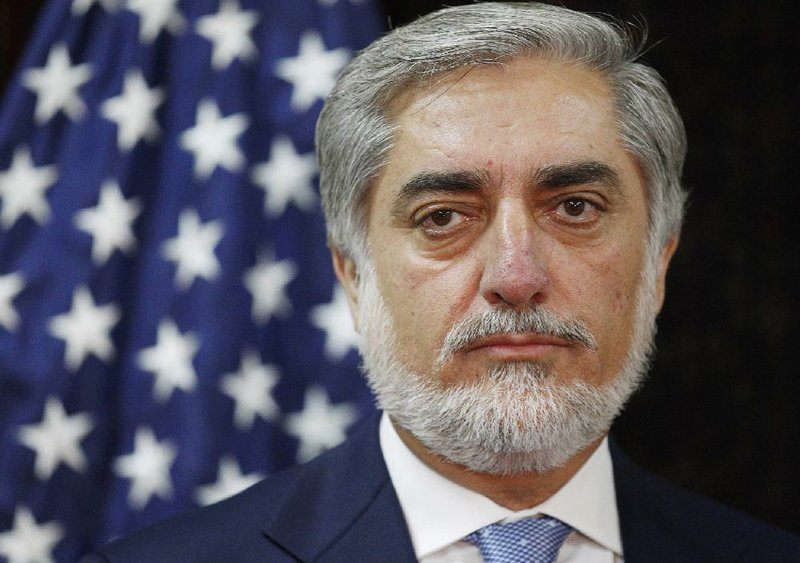KABUL, Afghanistan -- The deal that Secretary of State John Kerry brokered to ease the Afghan election crisis with a sweeping audit of the vote was built on an even more extensive reshaping of the entire government system, U.S. and Afghan officials confirmed Sunday: The sides have agreed to gradually create an empowered prime minister post after years of an all-encompassing presidency.
Nearly a decade after U.S. officials pushed a constitution with almost total powers for the president, it is a tacit admission that changing to a more parliamentary system -- a fraught undertaking at any time -- is now seen as crucial to holding the country together after years of mounting political crises and ethnic and factional hostilities, officials said.
The change was a central goal for the candidate Abdullah Abdullah, who has taken the entire political system to the brink with accusations of rampant fraud and threats to form a breakaway government, according to officials who were close to the negotiations.
They, like other U.S. and Afghan officials who confirmed the agreement, spoke on condition of anonymity because the details had not yet been worked out. They stressed that only a "framework" had been accepted in talks with Kerry, but they all agreed on its outlines.
The candidate who is declared president after a complete vote audit in the coming weeks will then appoint either the loser, or that candidate's nominee, to become a "chief executive" for the government, with powers to be agreed on later. Then, in the next two or three years, the constitution will be amended to create a parliamentary democracy with a prime minister as head of the government and a president as the head of state.
With no assurances even that the auditing for fraud will go smoothly during the next month, or that the result will be widely accepted, the change then would require a successful parliamentary election and the Afghan equivalent of a constitutional convention, all under the continuing threat of Taliban offensives to seize territory.
More immediately, the two candidates, Abdullah and Ashraf Ghani Ahmadzai, despite the recent tensions, are in the coming weeks to divvy up Cabinet posts, governorships and other jobs as Afghan and international elections officials review each one of the more than 8 million votes cast in the June 14 runoff.
Both Abdullah and Ahmadzai pledged to accept the results and form a national unity government when they announced the deal with Kerry on Saturday. But the only details they gave were about the audit; all three made vague references to a "political framework" without elaborating.
But Afghan and U.S. officials said Sunday that repeated election crises had made it clear that the Afghan government in its current form rewarded the winner of presidential elections too richly, and cut out the loser too thoroughly for a country with a history of civil strife that has often cut along ethnic and regional lines.
Similar setups, with dual poles of power in the presidency and in parliament, exist elsewhere, like France.
From the outset of his tenure, President Hamid Karzai sought to balance carefully his government. He was a southern Pashtun, and so he put an ethnic Tajik in the No. 2 spot, and ensured that leaders of the Hazara and Uzbek minorities had prominent roles.
Asked about the deal brokered by Kerry, Aimal Faizi, a spokesman for Karzai, refused to confirm the details. "The candidates have not said it publicly yet, so no comment from palace," he said.
For Ahmadzai, spokesman Abdullah Poyan would only say: "We never refused a national unity government. We know this is very sensitive."
Though Ahmadzai had a vast constituency behind him in his fellow Pashtuns, the largest ethnic group in Afghanistan, he had scant support among northern Tajiks, which would have presented a potentially life-threatening problem for him should he have won a disputed election amid accusations that his team had committed fraud.
As one senior member of the Northern Alliance asked Ahmadzai before the election: "If you win, who will drive you to the palace? You need allies."
For U.S. officials, as well, the support for the idea of revamping the Afghan government was born of necessity. This year's election crisis was the third in five years, including the 2009 presidential election and parliamentary elections a year later, both of which were marred by widespread fraud.
In fact, it was Kerry who had gone to Kabul in 2009 to talk Karzai into agreeing to a runoff against Abdullah, who subsequently dropped out of the race.
"You can say that the idea here is to make sure that Afghans don't have to have negotiations to create an inclusive government each time they have an election," one U.S. official said. "The political system itself, in the way it is set up, should be set up to be more inclusive."
A Section on 07/14/2014

